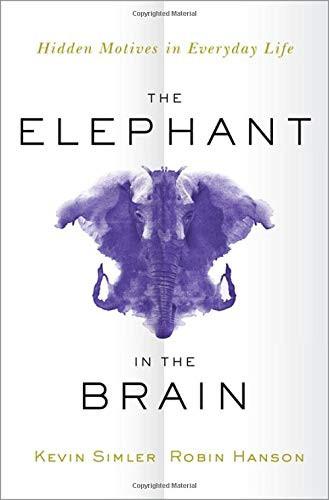Alex Benevolent's Key Ideas from The Elephant in the Brain
by Kevin Simler, Robin Hanson
Ideas, facts & insights covering these topics:
16 ideas
·20.5K reads
68
2
Explore the World's Best Ideas
Join today and uncover 100+ curated journeys from 50+ topics. Unlock access to our mobile app with extensive features.
Top 10 key insights we can gain from "The Elephant in the Brain."
"The Elephant in the Brain: Hidden Motives in Everyday Life" is a thought-provoking book by Kevin Simler and Robin Hanson that explores the hidden motives and unconscious behaviors that drive human decision-making and social interactions:
- Hidden Motives
- Self-Deception
- Social Status
- Altruism and Charity
- Hypocrisy
- Self-Interest in Relationships
- Education
- Healthcare
- Art and Entertainment
- Religion
175
2.29K reads
1. **Hidden Motives**:
Much of human behavior is driven by hidden motives, and we often deceive ourselves about our true reasons for doing things.
"We frequently fool ourselves, taking our own explanations seriously and at face value when, in fact, they are just stories, rationalizations for our actions."
173
1.87K reads
2. **Self-Deception**:
Humans are experts at self-deception, constructing plausible explanations for their actions that mask their true, often self-interested, motives.
"Our minds consist of a multitude of subagents, each with its own agenda and motives, which can often conflict with one another."
168
1.66K reads
3. **Social Status**:
A significant driver of human behavior is the pursuit of social status, as we engage in various activities to signal our value to others.
"We are status-seeking animals. Everything we do, we do in part because we want others to think well of us."
170
1.44K reads
4. **Altruism and Charity**:
Acts of altruism and charity often have hidden motives, including the desire for social recognition and admiration.
"Charitable acts are often more about the giver than the recipient, as they serve as signals of generosity and benevolence."
164
1.36K reads
5. **Hypocrisy**:
We frequently condemn certain behaviors in others while engaging in similar behaviors ourselves, a phenomenon known as hypocrisy.
"We are often quick to spot hypocrisy in others but are blind to our own hypocrisy."
165
1.29K reads
6. **Self-Interest in Relationships**:
Even in romantic relationships, self-interest plays a significant role as individuals seek to maximize their own well-being.
"In romantic relationships, we often prioritize our own interests, even if we claim to be completely selfless."
163
1.25K reads
7. **Education**:
One of the hidden functions of education is to signal intelligence and conformity rather than solely to acquire knowledge.
"Education serves as a signal of intelligence and conformity, often more so than as a source of practical knowledge."
162
1.2K reads
8. **Healthcare**:
Much of healthcare spending is driven by signaling concerns as people seek to demonstrate their commitment to their well-being.
"Our health behaviors are often about signaling that we care for our health rather than achieving optimal health outcomes."
155
1.14K reads
9. **Art and Entertainment**:
Art and entertainment can serve as signals of creativity, intelligence, and social identity.
"Our preferences for art and entertainment are influenced by the desire to signal our unique tastes and cultural affiliations."
156
1.1K reads
10. **Religion**:
Religious practices can be driven by the desire to signal moral values and commitment to the community.
"Religious rituals often serve as signals of moral righteousness and social conformity."
153
1.07K reads
11. **Politics**:
Political beliefs and affiliations are often driven by the desire to signal one's identity and values to a particular social group.
"Political ideologies are frequently used as badges to signal allegiance to a particular social tribe."
153
984 reads
12. **Language and Communication**:
Language is a powerful tool for signaling social and intellectual prowess.
"Our choice of words, vocabulary, and eloquence in communication can be used to signal our intelligence and social status."
157
1K reads
13. **Consumerism**:
Many consumer choices are made to signal one's wealth and social status to others.
"Consumerism is often about displaying one's economic success and social standing through material possessions."
155
979 reads
14. **Groupthink**:
Conforming to social norms and groupthink can lead to irrational and suboptimal decisions.
"Our desire to fit in with a group often leads us to make irrational decisions and conform to collective beliefs."
159
945 reads
15. **Economic and Political Systems**:
The book suggests that our economic and political systems are shaped by these hidden motives, with implications for policy and societal change.
"Understanding our hidden motives can help us design better economic and political systems that align with our true desires and incentives."
154
968 reads
IDEAS CURATED BY
Being an ambivert person, I am too much fond of reading, and always eager to learn.
CURATOR'S NOTE
"The Elephant in the Brain" provides valuable insights into human behavior, shedding light on the often-hidden forces that drive our decisions and interactions. It encourages readers to look beneath the surface and question their own motivations and the motives of others in various aspects of life.
“
Curious about different takes? Check out our The Elephant in the Brain Summary book page to explore multiple unique summaries written by Deepstash users.
Different Perspectives Curated by Others from The Elephant in the Brain
Curious about different takes? Check out our book page to explore multiple unique summaries written by Deepstash curators:
1 idea
18 ideas
Makayla D.'s Key Ideas from The Elephant in the Brain: Hidden Motives in Everyday Life
Kevin Simler, Robin Hanson
Discover Key Ideas from Books on Similar Topics
11 ideas
Motivation and What Really Drives Human Behavior
positivepsychology.com
5 ideas
Social
Matthew D. Lieberman
5 ideas
Social
Matthew D. Lieberman
Read & Learn
20x Faster
without
deepstash
with
deepstash
with
deepstash
Personalized microlearning
—
100+ Learning Journeys
—
Access to 200,000+ ideas
—
Access to the mobile app
—
Unlimited idea saving
—
—
Unlimited history
—
—
Unlimited listening to ideas
—
—
Downloading & offline access
—
—
Supercharge your mind with one idea per day
Enter your email and spend 1 minute every day to learn something new.
I agree to receive email updates
















